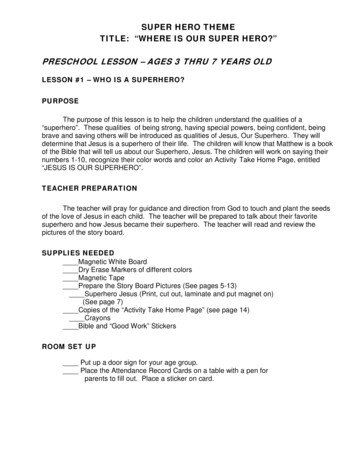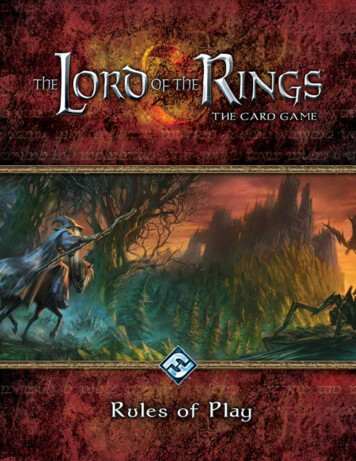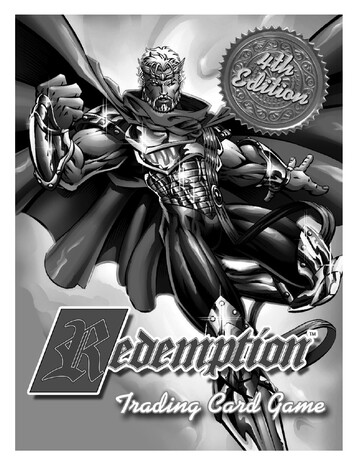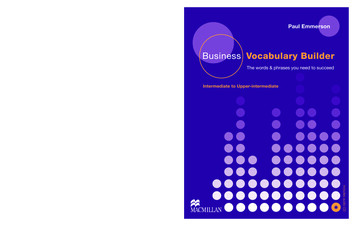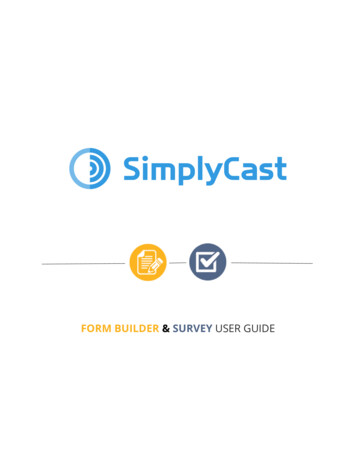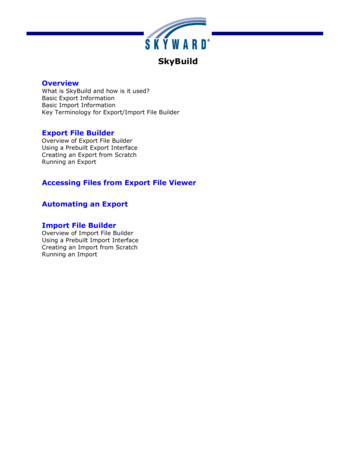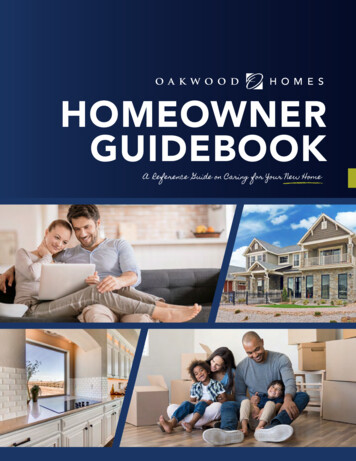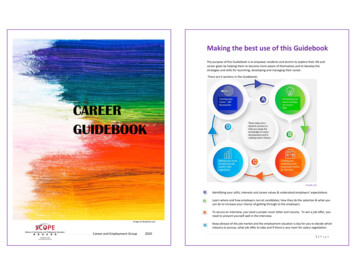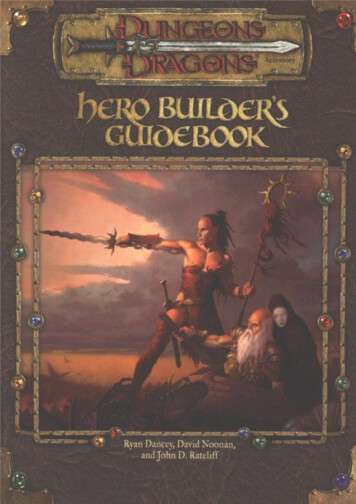
Transcription
HERO BUILDER’S GUIDEBOOKCreditsDesigners: Ryan S. Dancey, David Noonan, and John D. RateliffEditor: David NoonanCreative Director: Ed StarkArt Director: Dawn MurinCover Illustration: BromInterior Illustrations: Tennis CramerTypographer: Victoria L. AuslandGraphic Design: Sherry Floyd and Sean GlennProject Manager: Josh FischerProduct Manager: Chas DeLongDedication: All for one! One for all!Based on the original Dungeons & Dragons rules created by E. Gary Gygax and Dave Arneson, and the new Dungeons& Dragons game designed by Jonathan Tweet, Monte Cook, Skip Williams, Richard Baker, and Peter Adkison.Table of ContentsINTRODUCTIONROLLING YOUR ABILITY SCORESCHOOSING YOUR RACE AND CLASSCREATING YOUR PERSONAL HISTORYSELECTING AN ALIGNMENTPLANNING YOUR FUTURE CAREERAPPENDIX: THE RULE OF NAMES247385156661
INTRODUCTIONCreating a Dungeons & Dragons character is a process of evolution.INTRODUCTIONThe D&D game is a game about heroes.Through imagination, storytelling and fellowship,you can explore what it means to be a hero. Oneof the most exciting and rewarding parts of thegame is listening to the quiet voice of your innerhero, allowing some part of your own specialpotential to rise to the surface and reveal itself.Your character is more than just a collectionof statistics, random numbers, and equipmentlists. He or she is a mirror that can reveal thebright spark within you. Do not be content tosimply copy an image from a movie or a book.Don’t feel constrained to follow the easyformulaic heroes found in dozens of novels andany number of trite movies. Give your character apart of your own heroic potential. The reward willcertainly be worth the effort.WHAT’S INSIDEThe Hero Builder’s Guidebook providessomething extra during each step of the charactergeneration process. In short, you’ll developeverything that happened to your character beforehis or her first adventure. You’ll have a betterhandle on how you view the world — and whatthe world thinks of you. And you’ll know whatgoals you’re working toward.2We’ll start where all D&D characterstraditionally start: with six numbers between 3and 18 written on scratch paper. The Rolling YourAbility Scores chapter helps you make thosedifficult choices. You’ll learn just what the oddsare on rolling that 18, what to do if you getunusually low scores, and suggestions on how toroleplay a character whose abilities are muchdifferent than your own.At the heart of the character generationprocess is the Choosing Your Race and Classchapter. After all, when most people are askedwhat kind of D&D character they have, they reply“I’m an elven thief” or “I’m a human barbarian.”This chapter discusses each of the race/classcombinations available to 1st-level characters,providing tips for maximizing your character’spotential, tips for roleplaying them, and someunusual variants for each race and class.The Creating Your Personal History chapterdelves into your character’s pre-adventurer past.You’ll decide what your family is like, where yougrew up, and what friends and enemies you madealong the way. More than two dozen tables guideyou through your character’s childhood andadolescence, and you can either choose the resultsyou like or let the dice decide.Your characters alignment functions as amoral and ethical compass. and the Selecting anAlignment chapter helps you figure out whichway the needle is pointing. There’s a quiz you cantake to help decide the alignment that’s right foryou, and suggestions for meshing your alignment
INTRODUCTIONwith your character’s personality—and keeping itfun.We conclude our tour through charactergeneration with a glance at the future in thePlanning Your Future Career chapter. After all,the skills and feats you choose as a 1st-levelcharacter become the foundation for your laterchoices. Like a swords-and-sorcery guidancecounselor, this chapter points you in the rightdirection if you want to eventually become theultimate gladiator, gadgetmaster, or stealthysneak.Finally, veteran D&D players will tell you thatdeciding on a name for your character cansometimes be the toughest task of all. The Rule ofNames appendix lists hundreds of names you canuse or adapt for your character, and it explains thedos and don’ts of D&D character names.HOW TO USE THIS BOOKThe Hero Builder’s Guidebook is a companion tothe DUNGEONS & DRAGONS Player’sHandbook. You will need a copy of that book touse the tools provided in this product.The Player’s Handbook makes certainassumptions about your character: The characterhas been trained to a basic level of competence insome field. The character has established apersonal moral code. The character has been thebeneficiary of some financial largess to purchasebasic equipment and supplies. Perhaps the biggestassumption the Player’s Handbook makes is thatyour character is a hero. The Player’s Handbookhas no rules for creating player characters whowill be farmers, or swineherds, or householdservants. Unlike the common person in the worldyour Dungeon Master has created, your characteris about to embark on the most exciting, mostdangerous profession the world has ever known:adventurer!The Hero Builder’s Guidebook is designed tohelp you answer some of the many questions youmay have about your character. It will assist youin developing a rich history, a context for yourstorytelling more sophisticated than “I’m afighter” or “I’m a wizard.”This book will also walk you through thecharacter creation process, step by step. Itprovides advice for setting your starting abilityscores. You have at your fingertips dozens ofready-to-go character hooks awaiting only thespark of life you’ll bring to them. Inside you’llfind systems for developing the necessary socialstructures required for certain types of characters,like clerics, paladins, and monks. And thisguidebook can assist your DM, working with you,to create a whole range of nonplayer characterswith some connection to your character: friends,enemies, kin, acquaintances, lieges, etc.The objective of this material is to enrich yourrole-playing experience. Nothing within thesepages should be seen as a way to get between youand the hero you want to play. If a die rollproduces a result you don’t like, consult yourDM, then reroll or simply pick a more palatableoption. If you don’t like the choices your previousselections have produced, back up and take adifferent path. If you develop material on yourown, integrate it. In other words, do what it takesto make sure that when the game begins, you’ll beready to meet the challenge.BEGINNINGAll great stories have a beginning. Through themedium of the D&D game, you will tell an epicstory by creating the actions and dialog of acharacter uniquely your own. Your character’sstory begins here.Be sure you have the necessary implementshandy: dice, paper, and pencil. If you’re using theDUNGEONS & DRAGONS Character Generatorsoftware, be sure you know how the program’smany features work.If you’re going to be creating characters as agroup, make sure that you have enough space foreveryone to write, roll dice, write and make notes,erase and rewrite. If you plan to create yourcharacter with your DM on hand, provide spacefor her and her books and notes as well.Now, open your Player’s Handbook and turn tothe section on generating ability scores. Are youready? Adventure awaits!3
ROLLING YOUR ABILITY SCORESROLLING YOURABILITY SCORESYour character’s ability scores provide a roadmapindicating what types of adventuring classes yourcharacter is suited for, and what classes you maywant to avoid. The game allows you to chooseany class you wish for your character regardlessof the value of your ability scores. However,setting up your ability scores to match your goalshelps your character survive and thrive in a worldof danger and adventure.ABILITY SCORESAND BELL CURVESWithin D&D, the average human being isassumed to have a value of 10.5 in each score.The normal human range is from 3 to 18, and theaverage score is related to the roll of three sixsided dice (3d6). In prior versions of D&D, 3d6was the standard way to create ability scores forplayer characters. Due to the way that probabilityis expressed by three tumbling dice, the chancesof getting a score close to the average are betterthan the chance to get a score near either of thetwo extremes. This probability sequence is knownas a bell curve because if you plot the variouschances for various totals, the resulting shapelooks like a church bell.In case you were curious, the odds of rollingan 18 on 3d6 are about 1 in 200 rolls (about .5%).On average, only 3% of all characters createdusing this system should have an 18 in any abilityscore.Over many years, it became common practicewith many groups to change the basic system tocreate characters that were slightly better thanaverage. After all, these characters are heroes!After watching that practice develop and becomefairly widespread, we decided to embrace it withthis edition of the rules.You will roll 4d6 and keep the best threeresults. This has the effect of raising the averagetotal to 11.5. This doesn’t seem like a hugeincrease, but due to the way the math ofprobabilities expresses itself, it tends to createcharacters with one or two abilities that aresubstantially higher than average, and few if anythat are lower. In short, it tends to shift and flatten the bell curve slightly in your favor, makingyour character far more likely to be exceptionalthan average.The odds of getting an 18 using this systemare much better—about 3 times better than usingthe 3d6 system, in fact. About 9% of allcharacters should have an 18 as an ability scorebefore they apply racial modifiers. Under the 4d6system, your odds of getting a 15, 16, or 17 aresubstantially better as well. And your odds ofgetting a 3, 4, or 5 are commensurately reduced.Each character has something extra – something beyond the norm.4
ROLLING YOUR ABILITY SCORESThe same die rolls can result in very different characters.Starting Ability ScoresTo begin making a D&D character, follow theinstructions in the Player’s Handbook. Generatesix sets of die rolls, rolling four dice and keepingthe total of the best three. Record each total on aset of scratch paper.You are now ready to make the first deliberatechoices about your character: which scores willgo into each ability. Ability scores of 12 or higherwill provide a bonus to various die rolls in thegame, while ability scores of 9 or lower apply apenalty to various die rolls in the game.Here are some things to consider:Physical Ability Scores. Some scores aremore valuable to adventurers over the long termthan others. Because so many D&D adventuresinvolve combat, the physical attributes likeStrength, Dexterity, and to a lesser degreeConstitution have elevated importance. Considercarefully which scores to assign to those rs will base the power and number ofspells they can cast on one of the mentalattributes. Wizards use Intelligence. Clerics,druids, paladins, and rangers use Wisdom. Bardsand sorcerers use Charisma.The “Hopeless” Rule. Remember, if yourtotal modifiers are 0 or less, or if your highestscore is 13 or lower, you can ditch those rolls andtry again. Don’t feel bad about scrapping acharacter who qualifies as “hopeless.” But youmay want to consider playing such aOh, No! I Rolled a 3!character in spite of these problems.If you were unlucky enough toHeroes who have to overcome basicroll a 3, and your characterweaknesses can be some of the mostwasn’t “hopeless” (or you’rerewardingandmemorablegoing ahead anyway), youcharacters to play.Heroes with Low Scoresshouldstronglyconsiderbecoming a half-orc. The halforc race imposes a -2 penaltyto Intelligence, but theminimum intelligence for acharacter is 3. If you become ahalf-orc and put your lowscore into Intelligence, thehalf-orc Intelligence penaltyhas no effect!There have been a lot of characterspresented in D&D fiction over theyears. In the DRAGONLANCE world, a character named Raistlinhas one of the most seriousdrawbacks we’ve ever given aheroic character: His Constitution had beenshattered by the tests he was forced to undergo inthe Tower of High Sorcery. Raistlin’s ill health,his constant need to pause and catch his breath,and his susceptibility to minor chills and feverswould normally make such a ntures were being designed, playtesters usedthe characters who would later appear in thenovels in the game sessions. Instead of being afailure, the character of Raistlin became a dark,brooding presence in the adventure. He tried tostand apart from his brother on whom hedepended so greatly for physical support andprotection, and he sought magical power to5
ROLLING YOUR ABILITY SCORESreplace that stolen from him by his frail body. Bythinking about what it would be like to be sosickly, and yet still striving to become great, thecharacter of Raistlin was transformed from a bitpart to one of the most popular and enduringcharacters in all of heroic fantasy.Don’t fall into the trap of downplaying orignoring your character’s flaws. Those sameliabilities can be the hook on which you can hanga magnificent story of overcoming adversity inthe face of incredible odds!Wrapping up the Ability ScoresOnce you’ve gotten this far, you should feel prettycomfortable with the arrangement of abilityscores you’ve chosen. Take a few minutes toreexamine the work you’ve done to make surethat your character is shaping up to be the kind ofhero you want to play, that your group needs formutual support, and that your DM will be happyto allow into the game.You should be able to see the rough outlinesof your character emerging from the randomnessof the die rolls. The character isn’t well definedyet, but you can already discern certain traits.Notably, your character probably excels at a fewareas and may have a drawback or two. You maywant to spend some time writing down a fewthoughts about what this means for yourcharacter.Imagine how it would feel to be strong as anox growing up, or being known as a person who is“good with his hands,” or “sharp as a tack.”Sometimes negative experiences are formativetoo. Don’t neglect to think about what it wouldfeel like to be considered ungainly, sickly, or alittle slow. Real people are the sum total of theiraspirations, experiences, and ancestry. Yourimaginary character needs your help to fill inthose details. The more work you do at this level,the more real your hero will seem when the gamecommences.6Your Character Isn’t YouSome players have trouble keeping their ownpersonalities separate from those of theircharacter. The problem lies in the very nature ofroleplaying itself. Because you provide thecharacter’s personality, inevitably it’ll be basedon aspects of your own. The problem is greaterwith mental characteristics than physical ones, forobvious reasons. It’s easy to imagine what it’d belike to be faster, tougher, and stronger than youreally are (or clumsier, punier, and weaker). Butit’s hard for smart people to put themselves in themindset of stupid people and vice versa. It’s hardfor someone without much common sense to fakeit; insight into the world around you isn’tsomething that assigning an 18 to Wisdom willteach you. And it’s especially hard for a playerwith a forceful personality to roleplay anunimpressive, unassuming character - often theplayer’s force of personality will be what getsplayed, not the character’s.The solution, fortunately, is a simple one.Keep asking yourself, “What would [insertcharacter name here] do?” Your character verylikely has a different race, alignment, and possiblyeven sex than you do. His or her world is aradically different place from the one you live in.Why should your approaches to problems be thesame? If you’re willing to make the stretch to playa character in a different world, with skills andabilities you don’t actually possess, the restshould be easy. This approach also helps youdistinguish one character from another, ratherthan playing essentially the same character overand over under different names.After all, playing characters who aren’t likeyou and who regularly do things you wouldn’tdream of doing yourself (not in the real world atleast) is part of the fun. A shy player can play anoutgoing character, a law-abiding player can riploose in all kinds of mayhem, and a gentle playercan enjoy a knock-down, drag-out fight. Escapismis a valuable part of fantasy: a chance to walk insomebody else’s shoes, so to speak, and see theworld in an entirely different way. Takeadvantage of the change to take a different route.Enjoy the ride.
CHOOSING YOUR RACE AND CLASSCHOOSING YOURRACE AND CLASSThe two most important choices you will makeduring character creation are selecting yourcharacter’s race and first class.The eleven basic classes of D&D (barbarian,bard, cleric, druid, fighter, monk, paladin, ranger,rogue, sorcerer, and wizard) are each designed toprovide some, but not all, of the skills and abilityscores needed to thrive and survive in a land offantasy adventure. Likewise, the seven races(human, dwarf, elf, gnome, half-elf, half-orc, andhalfling) each have advantages and disadvantages.These guidelines work best if you will beplaying as a part of a group. Your character willhave stalwart companions (the characters of yourfellow players) who will work together toovercome obstacles, slay hideous monsters, andseek incredible treasure.If you are creating a character by yourself oryou have no way of knowing what other kinds ofheroes your character might meet during anadventure, you need to pay special attention to theareas where your character is strong and whereyour character is weak. Then you can make thebest use of the opportunities you find as youadventure.CHOOSING A RACEAND CLASSThe following sections provide advice for eachrace / class combination. Simply find the raceyou’re interested in, then choose a class. We’llsuggest where to put your ability scores andprovide guidance for feat and skill selection.More importantly, we’ll explain how that sort ofcharacter might view the world - and variants thatlead to different role-playing opportunities.Selecting a RaceThere are a host of things that will change aboutyour character as time progresses. Ability scoreswill improve, your character might choose manydifferent classes, and will master an arsenal ofskills. But there is one thing that will neverchange: your character’s race.When you consider a race for your character,think about the way the various racial modifiersand special abilities combine to focus thecharacter down those various paths.STANDARD RACIAL TYPESRACEHumanDwarfARCHETYPEFlexible, social, curious, luckyDour, hearty, stalwart, focusedElfGraceful, carefree,timeless, magicalGnomeEarthy, tricky,quiet, hardyHalflingQuick,sneaky,acquisitive, awareOrc*Savage, strong,wild, brutal*The orc is provided above to make thechart complete. Orcs are a bestial andevil race and they don’t make for verygood characters. But in a world offantasy, they sometimes make forinteresting parents!The next thing you will want toconsider are the effects that theracial ability score modifiers willhave on your character. These are:RACIAL MODIFIERSAiming for 20Right off the bat, you maynoticeapotentialforsomething extraordinary. Ifyou got lucky enough to rollan 18 for an ability score, youmay end up with a final scorethat is higher than the normalrange if you match it with theright racial modifier!There’s nothing wrongwith that. There are alwaysextraordinary individuals inany given population. Whilethere are not too many halforcs with a 20 Strength (lessthan 2% of the total half-orcpopulation), they are nottotally unheard of. If you havea 20, that means you are theabsolute pinnacle of your race.That might mean they’reexpecting great things fromyou.ABILITYADJUSTMENTSEFFECTSHuman NoneHumansdefine the AverageDwarf 2 Con, -2 Cha 1 hp per level, 10%penalty during socialinteractionsElf 2 Dex, -2 Con 1 to AC, 1 attack withranged weapons, -1 hp perlevelGnome 2 Con, -2 Str 1 hp per level, -1 attackand damage in melee,reduced carrying capacityHalf-Elf NoneEssentially human in thisrespectHalf-Orc 2 Str, -2 Int, 1 attack and damage in-2 Chamelee, enhanced carryingcapacity, lowered arcanespell-casting potential,fewer skill points, 10%penalty during socialinteractionsHalfling 2 Dex, -2 Str 1 to AC, 1 attack withranged weapons, -1 attackand damageinmelee, reduced carryingcapacityRACEBeyond the statistics and rules, there are socialreasons that you may want to select a particularrace. Talk to your DM about how the races areperceived in your campaign world. Find out aboutthe races’ histories and current conflicts. You mayfind numerous roleplaying hooks in the epic storyof your character’s race.Depending on current conditions in the game,and where the adventure begins, there may bemore direct benefits. Perhaps you know thelanguage of the locals, or you can call on familyor clan for assistance.7
CHOOSING YOUR RACE AND CLASSSelecting a ClassOnce you know what race you want to be – oreven if you’ve narrowed it down to a few choices– turn to the corresponding section in this chapterto learn how your race interacts with each class inthe D&D game.HUMANSHumans are the most varied race. They exist inalmost every environment, and theyUsing the Startingexplore the world with greatPackagesenthusiasm. Human settlements andIn general, Hero Builder’sfarms spring up quickly in theGuidebook uses the startingexplorers’ wake. Humans excel inpackages from the Player’scommerce, the study of the arcaneHandbook as a baseline. Eacharts, and military campaigns. Theyclass entry in Chapter 3:worship every god, follow everyClasses of the Player’sHandbook includes a readyalignment, and have a thousandmade selection of skills, feats,myths of their own origins andand equipment. In general, thecreation.starting packages give yourHuman characters are thecharacter solid choices for thestandout members of their race.traditional role of each class.Successful humans often becomeIf you’re an experiencedvastly powerful, ruling entireplayer and you want to createnations or becoming the counselorsan unusual character, you mayof kings and generals. Humanwant to consider forgoing theuse of the starting packages.characters are drawn from manyFor each class, you’ll findbackgrounds. Some are raised for asuggestions in Chapter 3 of thelife of adventure, while others findPlayer’s Handbook if you’rethe path as escaped slaves, runawaymaking a character withoutapprentices, or simply farmers’using the starting packages.children who hear the call of theirheroic hearts.Your human character can come from almostany background; the decision is up to you. Thefollowing class descriptions assume that yourcharacter is a young adult, with some very basictraining in a common profession or craft.Human BarbarianThere are three basicways for a human tobecome a barbarian:Be born as one, beadopted into a groupof them and followtheirways,orbecome isolated andsurvive by learningthe harsh lessons ofthe wilderness.Asahumanbarbarian, you are intune with the wilderness and your own wildnature. You might be a member of a small tribe, alarge clan, or none at all - a solitary hunter withties to no one.8Racial Advantage: Extra feat. Good choicesfor a barbarian include Alertness, Blind-Fight,Dodge, Power Attack, and Track.Racial Disadvantage: None.Ability Score Advice: Your key ability scoresare Strength and Constitution. The least useful areIntelligence and Charisma.Young Brave (Variant): You are a youngwarrior who seeks to gain fame and fortune,avenge a wrong, or defend the tribe against raids.You live off the land, making clothing fromtanned hides, finding safe food and water, andcreating weapons from wood, stone, and bone.Tattoos, colorful paint, feathers, and intricate hairbraids show your individualism. You have astrong sense of honor, but you only obey thecommands of the elders and the wise ones out ofrespect. Intricate rituals and tribal law don’tinterest you.Suggested Skills: Handle Animal, IntuitDirection, Listen, Move Silently, Ride,Wilderness Lore.Castaway (Variant): Lost or left behind, youhave survived against all odds by learning theways of the land. Now hardened by experienceand focused by solitude and danger, you havebecome a uniquely dangerous opponent while onfamiliar ground. If rescued or returned to civilizedlands, you will have to relearn the basic rules ofsociety and find a way to use the skills from onehostile world to thrive in another.Suggested Skills: Climb, Heal, Hide, Jump,Listen, Swim, Tumble.Human BardThe human bard canbe an entertainer, ateacher of socialvalues and importanthistory, a source ofpassion and pride - orsome combination ofall three. In somehumancultures,bards are viewed asone of the lowestsocial classes; beinga mere “entertainer”has little real value to society In others, bards areamong the most respected members of thesociety, unique individuals who preserve andprotect the cultural identity of the people.At some point, your human bard has becomeskilled in the performing arts: song, musicianship,the composition and reading of poetry, orstorytelling. You should compose a short tale thatdescribes how your character found this calling,then decide what types of performance you have anatural flair for.
CHOOSING YOUR RACE AND CLASSRacial Advantage: Extra feat. ImprovedInitiative, Skill Focus (Perform), and Dodgewould be good choices.Racial Disadvantage: None.Ability Score Advice: The key attribute foryou is Charisma. Intelligence and Dexterityenhance some of your special abilities andcommon bard skills. The least useful attributes fora human bard are Strength and Constitution.Jester (Variant): The jester survives by witand witticism. Performing either in public or inthe court of some noble, you find ways to exert asubtle influence on those around you. Those whorecognize the power of that influence alsorecognize the value of a good relationship withthe jester. You may become embroiled in plotsand counterplots, so you’re always ready to flee ifthings go badly. The best defense against anenraged monarch is to be gone before the guardscome pounding on the door.Suggested Skills: Bluff, Diplomacy, GatherInformation, Innuendo, Perform (many kinds),Tumble.Skald (Variant): You are a lorekeeper, theliving record of your people’s history andlegends. The skald memorizes long poems andsongs that recount the great deeds of years pastand teach lessons about morals and ethics. Youoften provide counsel for a decision by those whounderstand the value of remembering the past. Byadventuring, you ensure that the great deeds oftoday will never be ion, Heal, Knowledge (many kinds),Perform (Storytelling or Song), Wilderness Lore.Human ClericEveryone knows that there are many gods andgoddesses. Interceding between the unseenpowers of the universe and the common man isthe job of the cleric. By explaining the desires andcommandments of the gods, the cleric aids thepeople and shields them from the gods’ wrath.The cleric also heals the sick and stands firmagainst the unholy forces at work in the world.Racial Advantage: Extra feat. Clerics favorMartial Weapon Proficiency, Alertness, CombatCasting, Power Attack, and Scribe Scroll.Racial Disadvantage: None.Ability Score Advice: You should focus onWisdom and Charisma. If you have to put a lowscore somewhere, choose Dexterity.Village Priest (Variant): Every smallcommunity looks to a member of the clergy toattend to their spiritual needs. You are usuallyconsulted in matters of moral or ethical conflict,and you may even serve as judge in minordisputes. Most importantly, you are a patientlistener to confessions and provider of advice.Bandits and those intent on evil often take you forgranted - until confronted by clerical magic andthe unshakable knowledge of your divine support.Suggested Skills: Alchemy, Concentration,Diplomacy, Gather Information, Knowledge(religion), Scry.Crusader (Variant): Called by and innervoice or exhortations of the church elders, thecrusader leaves home to do battle in the name of agod or goddess. You’re crusading to right awrong, recover a lost relic, or retake holy ground.You expect to see a lot of combat and to be oncampaign for months or years.Suggested Skills: Concentration, HandleAnimal, Heal, Knowledge (religion), Ride, Scry,Spellcraft, Swim.HUMAN DRUIDHuman communitiestend to both shun andrespect the druids intheirmidst.Abundantharvestsand healthy crops areimportant, and thedepredations of wildanimalscanbeterrifying. But apersonwhohasembracedthewildness of naturerather than the comforts of home is somewhatfrightening. While you can expect a certainmeasure of respect, you will always be viewed asan outsider to your own people.Racial Advantage: Extra feat. Many feats aresolid choices for a druid, but Alertness and ScribeScroll are two of the best.Racial Disadvantage: None.Ability Score Advice: The key ability scorefor a human druid is Wisdom. Your least usefulability score is Intelligence.Hedge Druid (Variant): Living at the veryedge of civilized lands, you provide healingpotions, salves for insect stings, and othermedicines. Nearby communities usually ignoreyou - except when someone is ill or a crop hasbecome infested with parasites or disease. Fromtime to time, a local will come to you for adviceabout planting or dealing with vermin or a largepredator. Hedge Druids know the local farms,forests, streams and other territory well, so theytry to keep development and erosion to aminimum. You’re always watching for signs ofmalevolent magic or evil monsters.Suggested Skills: Alchemy, Animal Empathy,Handle Animal, Knowledge (nature), Scry, Swim,Wilderness Lore.9
CHOOSING YOUR RACE AND CLASSHuman FighterThe world is adangerousplace,and men-at-arms areever in demand.Fighter may be themost basic callingfor adventurers. Oneneed only
The Hero Builder’s Guidebook is a companion to the DUNGEONS & DRAGONS Player’s Handbook . You will need a copy of that book to use the tools provided in this product. The Player’s Handbook makes certain assumptions about your character: The character has b

